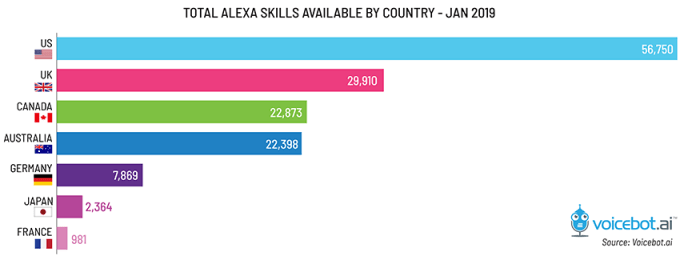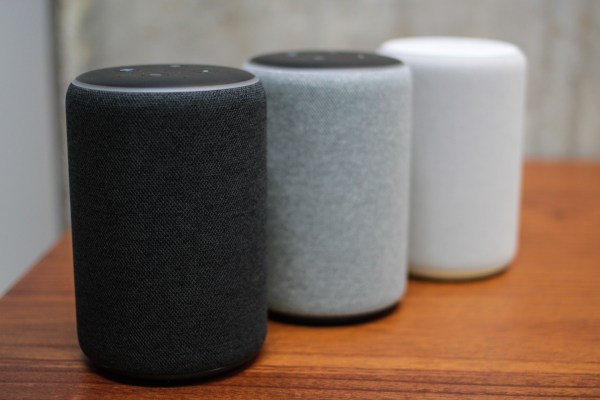Amazon Alexa had a good year as a developer platform – at least in terms of the number of voice apps being built for Alexa, if not yet the monetization of those apps. According to new data published today by Voicebot, the number of Amazon Alexa skills in the U.S. more than doubled over 2018, while the number of skills grew by 233 percent and 152 percent in Alexa’s two other top markets, the U.K. and Germany, respectively.
Amazon began the year with 25,784 Alexa skills in the U.S., which grew to 56,750 skills by the end of 2018, said Voicebot. That represents 120 percent growth, which is down from the 266 percent growth seen the year prior – but still shows continued developer interest in the Alexa platform.
At this rate of growth, that means developers were publishing an average of around 85 skills per day in 2018.
Voicebot has its own method for tracking skill counts, so these are not Amazon’s own numbers, we should note. However, Amazon itself did say at year-end 2018 that its broader Alexa ecosystem had grown to “over 70,000” total skills across markets.

In the U.K., the number of Alexa skills rose 233 percent this year to reach 29,910 by year end. In Germany, the skill count grew by 152 percent to reach 7,869 skills. Canada had 22,873 skills as of the beginning of January 2019; Australia has 22,398; Japan has 2,364; and France has 981. (Voicebot says it hasn’t yet set up a system for counting the skills in India, Spain, Mexico or Italy at this time.)
Also of interest is that much of the skill growth occurred near year-end, ahead of the busy holiday season when Alexa devices became top sellers. In the U.S., U.K. and Germany, developers published 181, 84, and 37 skills per day, respectively, during the last two months of the year.
The firm also pointed out there is some debate over whether or not the growth in third-party skills even matters, since so many of them are virtually invisible – never discovered by end users or installed in large numbers. That’s a fair criticism, in a way, but it’s also still early days for voice-based computing. Developers who are today publishing lower-rated skills may be learning from their mistakes and figuring out what works; and they’re doing so, in large numbers, on the Alexa platform.
As to what sort of skills are actually striking a chord with consumers, Amazon itself recently shared that information.
It released a year-end list of Alexa’s “top” skills, which were selected based on a number of factors including customer reviews, engagement, innovation and more, Amazon told us.
Many of the top skills were games. And many had benefited from their association with big-name brands, or had been promoted heavily by Amazon, or both.
Among the top games were music skill Beat the Intro; Heads Up!, already a top paid iOS app from Ellen DeGeneres; National Geographic’s Geo Quiz skill; Question of the Day; Skyrim Very Special Edition; The Magic Door; Trivia Hero; World Mathematics League; Would You Rather for Family; and Volley’s roleplaying game, Yes Sire.
The non-game skills were focused on daily habits, wellness, and – not surprisingly, given Alexa’s central place in consumers’ homes – family fun.
These included kid-friendly skills like Animal Workout, Chompers, Kids Court, Lemonade Stand, and Sesame Street; plus habit and wellness skills like Chop Chop, Fitbit, Headspace, Sleep and Relaxation Sounds, Find My Phone, AnyPod, Big Sky, Make Me Smart, and TuneIn Live.
It’s interesting to note that many of these also are known app names from the mobile app ecosystem, rather than breakout hits that are unique to Alexa or smart speakers. That begs the question as to how much the voice app ecosystem will end up being just a voice-enabled clone of the App Store, versus becoming a home to a new kind of app that truly leverages voice-first design and smart speakers’ capabilities.
It may be a few years before we have that answer, but in the meantime, it seems we have a lot of voice app developers trying to figure that out by building for Alexa.
